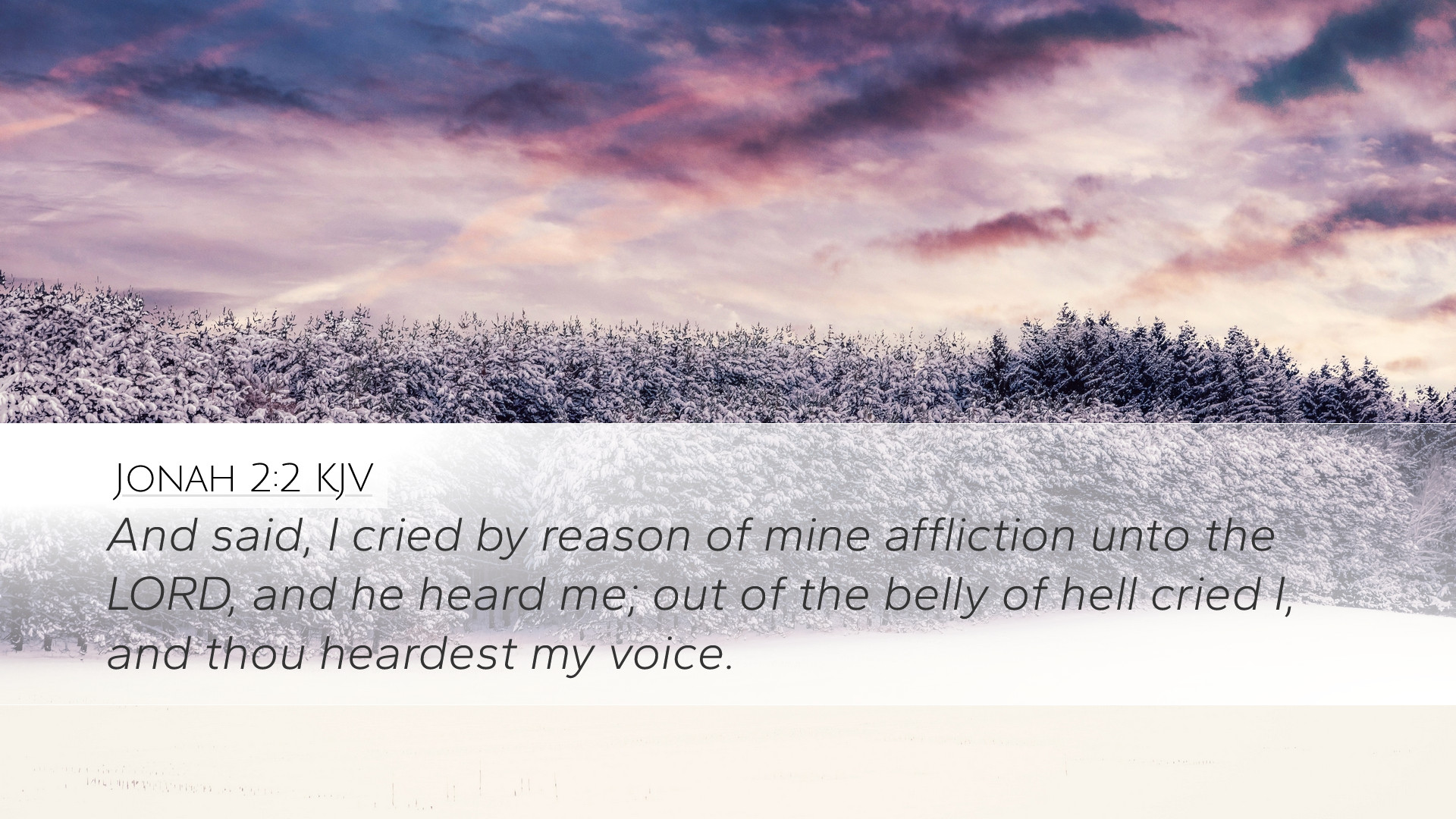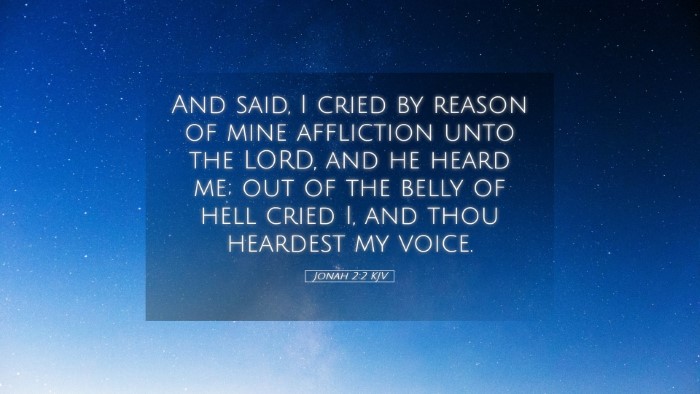Old Testament
Genesis Exodus Leviticus Numbers Deuteronomy Joshua Judges Ruth 1 Samuel 2 Samuel 1 Kings 2 Kings 1 Chronicles 2 Chronicles Ezra Nehemiah Esther Job Psalms Proverbs Ecclesiastes Song of Solomon Isaiah Jeremiah Lamentations Ezekiel Daniel Hosea Joel Amos Obadiah Jonah Micah Nahum Habakkuk Zephaniah Haggai Zechariah MalachiJonah 2:2
Jonah 2:2 KJV
And said, I cried by reason of mine affliction unto the LORD, and he heard me; out of the belly of hell cried I, and thou heardest my voice.
Jonah 2:2 Bible Commentary
Commentary on Jonah 2:2
Verse: Jonah 2:2 - "And said, I cried by reason of mine affliction unto the LORD, and he heard me; out of the belly of hell cried I, and thou heardest my voice."
Introduction
Jonah 2:2 is a profound verse that captures the essence of Jonah's prayer from the depths of despair. This passage reveals key theological themes such as repentance, divine mercy, and the power of prayer. In this commentary, insights from Matthew Henry, Albert Barnes, and Adam Clarke will elucidate the meaning and implications of Jonah's cry to God.
Contextual Analysis
Jonah's situation in this verse is critical to understanding its significance. After fleeing from God's command, Jonah finds himself in the belly of a great fish, a state of distress and hopelessness. This context emphasizes the transformative nature of affliction that leads to spiritual awakening.
Matthew Henry's Insights
- Henry points out that Jonah's prayer arises from deep affliction, highlighting the poignancy of his situation. In his dark moment, Jonah turns to the Lord, which is a crucial step in his restoration.
- The phrase "out of the belly of hell" underlines the severity of Jonah's plight, signifying not only physical darkness but also a spiritual reckoning. Henry interprets this expression as Jonah experiencing a living hell, which serves as a humbling realization of his rebellion against God.
- Henry emphasizes that true prayer arises from acknowledgment of one's state. Jonah's cry is not just a lamentation; it is a genuine plea for divine assistance, reminding us that God listens to the cries of the afflicted.
Albert Barnes' Commentary
- Barnes elaborates on the concept of "affliction." He posits that Jonah's affliction is multifaceted, involving physical, emotional, and spiritual dimensions. It serves as a catalyst that drives Jonah back to God, portraying the doctrine of repentance and return.
- He asserts that God's response to Jonah's cry exemplifies divine grace. Despite Jonah's disobedience, God hears and responds, illustrating the depth of God's mercy towards those who genuinely seek Him, even amid their failures.
- Barnes also discusses the theological implications of God's hearing. The verse reflects the assurance that prayer, regardless of the circumstances or location, reaches God. It embodies the idea that distance or a deep state of despair does not preclude divine intervention.
Adam Clarke's Perspective
- Clarke emphasizes the phrase "I cried," noting that it reflects the intensity of Jonah's desperation. This underscores the human desire for divine connection during moments of profound need.
- In Clarke’s view, the term "hell" can be understood in various senses, such as a literal geographical descent into the sea or a metaphorical spiritual condition. This dual interpretation adds richness to the understanding of Jonah's plight.
- Clarke articulates that Jonah's confession of his affliction aligns with a broader biblical narrative that emphasizes God's readiness to forgive. It highlights the importance of recognizing one’s faults as a precursor to experiencing divine grace.
Theological Reflections
This verse serves as a reminder to pastors and theologians about the nature of prayer under duress. It speaks volumes about the human condition and the necessity of relying on God's mercy. The act of turning toward God in times of despair symbolizes repentance and the recognition of one's need for divine assistance.
Affliction as a Pathway
Affliction is portrayed as a significant, if painful, pathway to grace. It compels introspection and realignment with divine will. This notion is central to the Christian experience; many believers identify their most profound moments of spiritual growth as arising from trials and tribulations.
God's Faithfulness
An essential theme in this passage is God's faithfulness in hearing and responding to our prayers. Even when we stray from His commands, His willingness to restore is unwavering, reflecting His character as merciful and compassionate.
Conclusion
Jonah 2:2 encapsulates a critical moment of personal and spiritual crisis that leads to restoration through sincere plea to God. The insights from Henry, Barnes, and Clarke enrich our understanding of the dynamic interplay between human distress and divine grace. For pastors, students, theologians, and scholars, this verse serves as a profound reminder of the depth of God’s mercy and the transformative power of genuine prayer.


